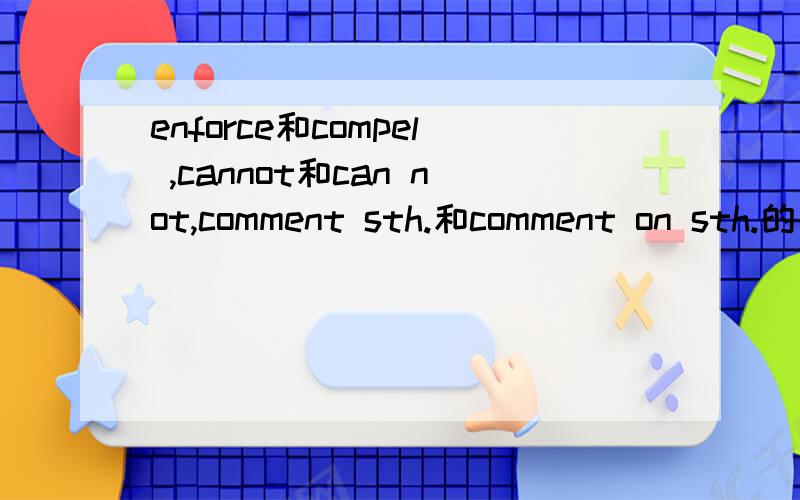enforce和compel ,cannot和can not,comment sth.和comment on sth.的区别
来源:学生作业帮助网 编辑:作业帮 时间:2024/11/26 04:52:39

x��T�R�P~�\��
�3���cD��H��^bA���S��
J":ژ x�N���ݓ�2��W�m��~�������DiG��D�\�ɩ����� I��
�ġ��CJ�.�솂8�S�|�wX�� �et;~I�pz+����L��^Z��ޢ�g�1�#�{� ��l�wȰ�uh�����J
���Y6�T��F�|Lfqw���7���J
�E�sP
`��=��D
�U��Kz^t
s�P]��z�^�m ]���:!�Ȁf
���s,GC�&���">����-ݒ��a���@�\#G�+hN��B����,Ϟ 'pF�Ž�ɒ�bJB�^�4Ws�+�w�"��D�u(�^� [
��.2n�JP�z�+�]P�
b�w0���B��'P��z�� ���+(���
��:��
�~���FBoEn
�9�%�Ps�cLL&Y��D2r�
�
ȍ.^��9,T�f�$`�ؠ7X��:3��kF��K��3F� ��q֏���Uy/å3rZ�
IF�-��v�+��eRM#7�ْ9À߿ذ�D�ߥ
)?���qY!�g;� ��� ����8�q�`�8���&� �FE@'�
�SmBfc�Y����> u,
my;�x/�J��f�U�iW+������U��O��PY�,��h��а�C�zb���Y���)���F
m:��!'c�������iA�b���l|�)
enforce和compel ,cannot和can not,comment sth.和comment on sth.的区别
enforce和compel ,cannot和can not,comment sth.和comment on sth.的区别
enforce和compel ,cannot和can not,comment sth.和comment on sth.的区别
cannot和can not:
英,美两个国家对此都有不同的解释,不过综合以上英美两国的资料来看,can not 分开写的方式不是被视为错误,就是极为罕用.相反的,cannot 被认为是正式的使用方式.至於 can’t 一般只当成 cannot 的缩写形式 (contraction),而且是比较后来才出现的写法,少有单独讨论.
comment sth.和comment on sth.:
comment作及物动词,常接that所引导的从句,
例:.He commented that it was an excellent film.他评论这电影很精彩.
作不及物动词或名词时,常接on/upon
例:.作名词:He made no comments on our proposal.他对我们的建议没有作评论.
作不及物动词:He did not comment on what I said.他对我的话未作评论
enforce和compel
compel是强迫某人做某事或迫使其让步,其语意比force轻,比oblige重.
enforce通常指用武力或客观的情势迫使人背著意志去做某事
资料来源:自己的脑袋+查字典